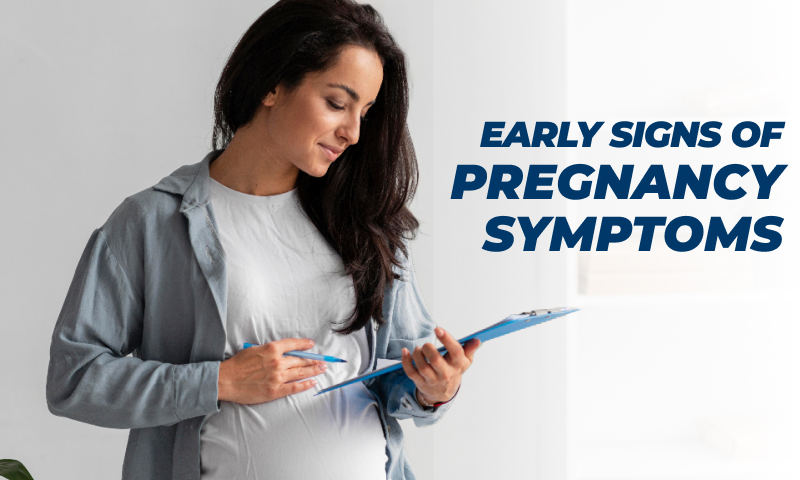Pregnancy is a transformative and miraculous journey in a woman’s life, marked by creating a new life within her body. The early signs of pregnancy are nature’s way of signalling the onset of this incredible process. Recognizing and understanding these symptoms is crucial for those planning or suspecting pregnancy. This comprehensive guide explores the intricate tapestry of Early Signs of Pregnancy Symptoms, shedding light on the physical and emotional changes a woman may experience. From subtle shifts to more pronounced indicators, each sign serves as a beacon, guiding both the expectant mother and those around her through this captivating chapter of life.
Early Signs of Pregnancy Symptoms
The earliest signs of pregnancy often appear within the first few weeks after conception. While each woman’s experience is unique, there are common signals that may show the onset of pregnancy.
**Also Read ** – Pregnancy symptoms week by week
Missed Menstrual Period
The most classic and recognized early sign of pregnancy is a missed menstrual period. When a woman becomes pregnant, her body undergoes hormonal changes that prevent the usual shedding of the uterine lining. This absence of menstruation prompts many women to suspect pregnancy.
Morning Sickness
Nausea and vomiting, known as morning sickness, can begin as early as two weeks after conception. Despite its name, this phenomenon can occur during the day. I believe that it is associated with increased hormone levels of human chorionic gonadotropin (hCG).
Breast Changes
Hormonal fluctuations in early pregnancy can lead to changes in breast size, tenderness, and sensitivity. The breasts may feel fuller, heavier, or tenderer to the touch. The areolas might darken, and visible veins may become more pronounced.
Fatigue
A heightened sense of fatigue is a prevalent early pregnancy symptom. The body undergoes significant changes to support the growing fetus, leading to increased energy expenditure and a subsequent feeling of tiredness.
Frequent Urination
Hormonal changes and increased blood flow to the pelvic area can cause a frequent urge to urinate. This symptom surfaces within the first few weeks and continues throughout the pregnancy.
Mood Swings
Fluctuating hormone levels can affect neurotransmitters in the brain, contributing to mood swings and emotional sensitivity. Women may experience heightened emotions, ranging from joy to tearfulness.
Food Aversions and Cravings
Changes in taste and smell, influenced by hormonal shifts, may lead to food aversions or cravings. Some women develop strong preferences for certain foods, while others may find enjoyed foods unappealing.
Slight Bleeding or Spotting
Known as implantation bleeding, some women may experience light spotting when the fertilized egg attaches to the uterine lining. This can occur around the time of the expected menstrual period, confusing some women.
Pregnancy Symptoms in Women
Understanding how pregnancy symptoms manifest in women is crucial for timely recognition and care. These symptoms encompass both physical and emotional changes, providing a holistic view of the transformative journey into motherhood.
Physical Symptoms
- Weight Gain: Gradual weight gain is a natural and expected aspect of pregnancy. It is essential to support the developing fetus and prepare the body for childbirth.
- Back Pain: The growing uterus can exert pressure on the lower back, leading to discomfort and back pain.
- Swollen Ankles and Feet: Increased fluid retention, coupled with the growing uterus, can cause swelling of the ankles and feet.
Emotional and Psychological Symptoms
- Mood Swings: Hormonal fluctuations can contribute to mood swings, varying from euphoria to irritability.
- Anxiety and Nesting Instinct: The impending responsibilities of motherhood may trigger anxiety, while the nesting instinct drives women to prepare their living space for the baby’s arrival.
- Emotional Bonding: Many women experience a profound emotional connection with the growing baby, fostering a sense of maternal love and protection.
Gastrointestinal Symptoms
- Constipation: Hormonal changes can slow down the digestive system, leading to constipation.
- Heartburn: Increased pressure on the stomach and hormonal influences can cause heartburn, a common symptom in later stages of pregnancy.

Early Pregnancy Symptoms
Early pregnancy symptoms serve as the initial whispers of the incredible journey unfolding within a woman’s body. Recognizing these signs in the early stages is essential for proper prenatal care and maternal well-being.
Implantation Bleeding
Occurring around the time of the expected menstrual period, implantation bleeding is a light, brief spotting that results from the fertilized egg attaching to the uterine lining.
Enhanced Sense of Smell
Hormonal changes may heighten a woman’s sense of smell, leading to aversions to certain odours and cravings for others.
Basal Body Temperature
Some women track their basal body temperature as part of fertility awareness. A sustained increase in basal body temperature after ovulation may show pregnancy.
Elevated Basal Body Temperature
A subtle but noticeable rise in basal body temperature can be an early sign of pregnancy. It shows the body’s increased metabolic activity to support the growing embryo.
Darkening Areolas
The areolas, the pigmented areas around the nipples, may darken in colour because of hormonal changes.
Heightened Sensitivity to Nipples
Increased hormonal activity can make the nipples more sensitive and tender.
Pregnancy Signs and Symptoms
The signs and symptoms of pregnancy form a complex interplay of physiological and emotional changes. Recognizing these signals is pivotal for expectant mothers and healthcare providers to ensure a healthy pregnancy journey.
Confirmation through Pregnancy Tests
Home pregnancy tests, available and reliable, detect hCG in urine. These tests provide a quick and accessible means of confirming pregnancy.
Ultrasound Imaging
Ultrasound examinations offer visual confirmation of pregnancy, allowing healthcare providers to assess the viability of the pregnancy, estimate gestational age, and monitor fetal development.
Blood Tests
Blood tests, such as the quantitative hCG test, provide precise measurements of hCG levels, offering additional confirmation and insight into the progression of pregnancy.
Physical Examinations
Clinical examinations, including pelvic exams and palpation of the abdomen, provide healthcare professionals with valuable information about the uterus, cervix, and overall pregnancy health.
A like blog – Every Stage, Every Need | Best Multivitamins For Women
Conclusion
In the symphony of life, early signs of pregnancy are the initial notes, setting the stage for a transformative journey into motherhood. From missed periods very subtle physiological changes, each sign is a testament to the intricate dance of hormones, signalling the creation of new life. Understanding these signs empowers women and their partners to embark on the pregnancy journey with knowledge and preparedness.
As the body undergoes remarkable transformations, so too does the emotional landscape. Mood swings, cravings, and a deepening emotional bond with the growing baby become threads woven into the fabric of the maternal experience. It is a journey marked by physical and emotional shifts, reminding us of the profound miracle unfolding within.
FAQs
What is the earliest sign of pregnancy?
The most common early sign is a missed menstrual period.
When does morning sickness start?
After conception, morning sickness may start as soon as two weeks later.
How do breasts change in early pregnancy?
Breasts may become tender and fuller, and the areolas might darken.
Is fatigue a common early pregnancy symptom?
Yes, heightened fatigue is a prevalent early symptom.
What causes frequent urination in early pregnancy?
Hormonal adjustments and an increase in blood flow to the pelvis.

